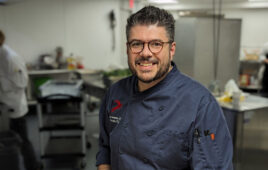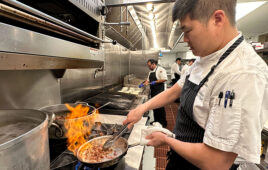
When creating a welcoming environment for Lake of Isles guests, the Director of Catering, Bethany Arico (pictured in blue), advises staff not to underestimate the power of having a smile on their faces.
At the height of wedding season, clubs are accented by the colorful dresses and suits of wedding parties and guests against a backdrop of black-and-white-clad personnel. With servers and waitstaff busily scurrying to and fro as they replenish bread baskets, clear away empty plates and make room for the next course, they signify a carefully orchestrated dance that assures efficiency and premiere service.
As they make up the past two years of limited gatherings imposed by pandemic restrictions, clubs have resumed full banquet operations, which requires staffing. While banquet managers fine-tune game plans for special events, they must create a service culture that attracts reliable employees and affirms a club’s stellar reputation.
Like Family
Banquet Manager Paul Williams prides himself on knowing his staff so well that when it comes to servicing an upcoming event at the Atlantic City Country Club (Northfield, N.J.), he is 100 percent confident his crew will get the job done.
“I try to train my staff to take my job because you are only as good as your team,” he says.
While he’s spent the past six years at the club, Williams got his start just down the road at Harrah’s Hotel and Casino, filling in when the banquet manager was on vacation. Before heading up banquets at ACCC, he began as restaurant manager and learned the business from the bottom up.
While Williams’ banquet staff is separate from the club’s restaurant, he relies on a core group of employees who have outside jobs, including two teachers, a fireman and a pharmacy technician. Rather than use staffing agencies, he employs extra part-time staffers to work weddings and other larger events. Like his permanent crew, these workers juggle their shifts with other work and school commitments. To ensure that his banquet team maintains specific standards of excellence, Williams strives to create an environment of respect and knowledge, bolstered by his constant coaching.
“Never settle for status quo,” he says. “You should constantly be looking to improve because who is great today will be average tomorrow.”

Guided by Banquet Manager Paul Williams, Atlantic City CC staff have developed an eye for detail and perfect timing.
Besides creating memorable table settings and displaying proper etiquette, Williams and his staff have developed an eye for detail and perfect timing. He likens the ability to fine-tune his processes to a baseball coach, knowing where each player excels.
“As a coach, you need to know your team members’ strengths and weaknesses and put the right people in the right positions,” he advises. “I wouldn’t put a baseball player with a weak arm in center field, just like I wouldn’t put a server who isn’t good with customers as a front server.”
Knowing how to handle obstacles as they emerge is key to remaining consistent in banquet service. Williams isn’t one for placing blame when things go wrong; instead, he values the importance of those who can find a solution and credits problem-solving skills for obliterating potential pitfalls before a customer is aware of them.
“One of my old bosses would say, ‘There are no problems; there are challenges.’ It is how you handle the challenge that matters,” Williams says.
He recalls a past incident when a small wedding party brought a cake that did not travel well. Taking matters into his own hands (quite literally), Williams went to the store, bought some icing and cake decorations, and resurrected it—with “minimal pastry skills.”
As the fallout from the pandemic continues to unfold, Williams relies all the more on his team, one that he proudly notes has remained relatively consistent throughout his tenure. In turn, he provides them with a stable work environment that enables them to grow professionally.
“I try to supply them with the tools and knowledge to do their job correctly,” he says. “My team knows what is expected of them, and I like to coach on the fly to reinforce those expectations.”

A mixture of full-time, part-timers and weekend-only staffers well-versed in working weddings make up a solid, well-balanced banquet crew at Lake of Isles.
A Well-Oiled Machine
Leading by example is the mantra of Bethany Arico, Director of Catering at Lake of Isles in North Stonington, Conn. The former banquet manager, who has spent the past 12 years at this Troon club, credits her previous food and beverage manager for teaching her the ropes. As a result, she’s not afraid to roll up her sleeves and pitch in when necessary. To get her staff up to speed on the day’s agenda, Arico emphasizes the importance of “on-the-spot training.”
“If you have ever worked on a banquet before, it is very hands-on—and that is always the best way to train,” she says.
A mixture of full-time, part-timers and weekend-only staffers well-versed in working weddings make up a solid, well-balanced banquet crew poised to handle any event size.
“We don’t need to rely on temp help for large gatherings, as we are fortunate to have different levels of the food and beverage department,” she says. When needed, she can pull from the on-site public restaurant to work an event, illustrating the value of cross-training.
When defining what makes a functional service environment in the banquet space, Arico stresses communication and efficiency as demonstrated by solid leadership: “You want to be efficient when serving a table as well as clearing the table,” she says. “Be seen by guests; however, be invisible to guests, so you are not obtrusive.”
One of her key pieces of advice: Never underestimate the simple act of having a smile on your face to ensure a welcoming setting for members and guests.
Because communication is an essential element of a successful banquet operation, Arico listens to her staff and gets involved whenever they need an extra pair of hands.
“There have been times when I have helped carry dinners out due to emergencies or even call-outs for the day,” she recalls.
And when the pandemic forced her to revamp the banquet operations, Arico advised her team to focus on what they were permitted to do safely instead of what they couldn’t. “There was a point in time that we were not allowed to offer passed hors d’oeuvres, so we adjusted and made a station out of them where our staff would serve,” she explains.
Whatever obstacle her banquet staff encounters, Arico firmly believes that the power of positive reinforcement serves her well as a team leader.
“You have to act as a cheerleader for the staff,” she says. “There is nothing we can’t do.”




